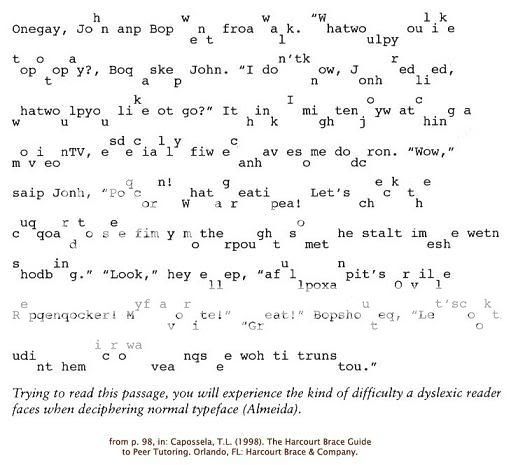Dyslexia in the real world: how well does the media portray dyslexia?
Are you, or do you know someone who has dyslexia? chances are you do. One in five people have some form of dyslexia, and it ranges from very mild to very severe. Well what exactly is dyslexia? I personally have always though dyslexics see letters missing parts, jumbled on the page, moving around, or reversed kinda like this:



But is this an accurate portrayal of dyslexia? Lets look at what dyslexia looks like in the media.
Dyslexia in Hollywood
The Cosby show was a very popular and much loved show about an upper middle class African-American family. though a sitcom, it tackled many more serious issues, including dyslexia. In an episode titled “Theo’s Gift Theo is struggling in school, and instead of assuming he’s slow mentally, they take him to a learning specialist, where he is diagnosed with dyslexia. When they understand better what he’s dealing with, Theo learns that he needs to find new strategies to study and improve his grades.
In Percy Jackson and the Lightning Thief, a popular children’s book turned movie, there is another interesting take on dyslexia. the premise of the story is that the main character unknowingly is the son of a Greek god, but before he figures all this out, he struggles in school. whenever he would see words, the letters would literally move around on the page to the point where he never scored above a C in his life. he was diagnosed with Dyslexia in the “real” world, but in the world of the Olympians, his mind was hardwired for ancient Greek! Pretty convenient right. throughout the novels he fights many a mythological Greek villain, and triumph over all. this character trait was intentionally correlated with dyslexia by the author; he wanted to show that people with dyslexia can amount to great things, regardless of the obstacles.
Often people struggling in school are considered to lack intellect, but sometimes it is something different like what dyslexics experience. Often they tend to get frustrated or depressed, because they dont understand why they cant read as fast as other kids, or perform as well in class. The media actually does a very good job at shedding some light on the struggles people with dyslexia encounter in everyday tasks, and also in showing how its possible to overcome. dyslexics simply need more diverse learning strategies, and patience in the classroom. these media portrayals of dyslexia are fairly accurate in terms of the difficulties dyslexics experience, however they do not shed much light on what the actual neurological mechanisms of dyslexia.
Media has portrayed living with dyslexia accurately, but neurologically? what is it? dyslexia is a neuro-biological learning disability characterized by difficulties with spelling and reading abilities that result from a deficit in the phonological (systemic organization of sounds in languages) component of language. dyslexia is not just one deficit, but rather a spectrum. They range from producing errors in phonetic pronunciation, and comprehension, to no semantic errors but sensitivity to correctness, to sometimes blending elements of two words into one, and recognizing individual letters, but not being able to read single words. It also appears to be caused by malfunctions of many different regions, from the fusiform gyrus, to the temporal lobes. There’s so much diversity within the disorder, that the experience of dyslexics varies widely; so I wouldn’t be so quick call dyslexia a disorder, but rather an umbrella term for all disorders involving difficulties with spelling and reading on a phonological level. I believe its safe to say, though dyslexics struggle with a wide range of issues, it is very possible to live a somewhat normal life with the disorder. More than just live, dyslexics can thrive! Many famous intellectuals such as Albert Einstein and Leonardo Da Vinci struggled with dyslexic, as well as famous business tycoons such as Richard Branson and Shark Tank star Barbara Corcoran (and the list goes on!).
The media shows an accurate portrayal for living with dyslexia, but it talks very little about how much dyslexia varies from person to person. It’s great that they are showing how dyslexics can overcome their situation, but there is definitely more to it then what you see on TV!
References:
http://www.ncbi.nlm.nih.gov/pmc/articles/PMC2812748/
http://www.entrepreneur.com/article/237669
http://www.theledger.com/article/20080328/NEWS/527509844
Lyon, G.R., Shaywitz, S.E., Shaywitz, B.A. (2003). Defining dyslexia, comorbidity, teachers’ knowledge of language and reading. Annals of Dyslexia, 53.
Demonet, J., Taylor, M., & Chaix, Y. (n.d.). Developmental Dyslexia. The Lancet (british Edition), 363(9419), 1451-1460.
